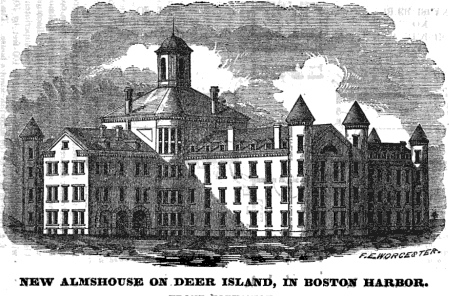
From 1847 to 1849, about 4,186 people were quarantined “as a precautionary measure to ward off a pestilence that would have been ruinous to the public health and business welfare.” Not all made it off the island! To make matters worse, those who did were not welcomed by Boston’s Yankee population; they had ruled the city since Puritan days and held the anti-Irish, anti-Catholic prejudice of Boston’s founders. The city grew from some 115,000 to more than 150,000 in 1847 alone and the new Irish soon realized that they had escaped the age-old prejudices in Ireland only to confront it again in this new land. They settled in Boston’s North End tenements where conditions were not much better than on the coffin ships. Of children born there at the time, about 60 percent died before the age of six!
On the Saturday of the 2019 Memorial Day weekend, hundreds gathered to dedicate a huge Celtic Cross Memorial on Deer Island to bestow the respect and recognition the Deer Island deceased were denied in life. It was dedicated to the memory of some 1200 laid to rest in unmarked graves on the island between 1847 and 1852 according to City of Boston Archivist John McColgan.
The memorial, which is visible from virtually every point of the harbor’s edge, was the idea of the late Dr. William O’Connell and his wife, the late Rita O’Connell. They wanted the public to know what happened on that island for, as Rita said, “It’s important we don’t forget the stories of people such as Patrick J. McCarthy, who lost his mother, father, and six siblings on Deer Island but went on to graduate from Harvard and become mayor of Providence.”
Calling to mind those who survived brutal conditions crossing the Atlantic only to perish with the new life they sought so near and yet so far, McColgan told the crowd harrowing tales of ordinary people willing to sacrifice anything for a better life, of ships arriving with orphans whose parents starved during the voyage because feeding their children was their priority. He said the Irish immigrants who died on the island, “had become a poignant symbol of famine-era tribulation endured by the unnumbered thousands who suffered trauma, poverty, disease, and death, thanks to a government in London that placed political power and private profit over poor people.”
During the ceremony Mayor Martin J. Walsh, the son of Irish immigrants, saluted those who had worked for a quarter-century to build the memorial, especially the late O’Connells who led the effort. “Like much of Irish culture, this memorial marks profound suffering with remarkable beauty,” he said. “The truth is, it’s unbearably sad to imagine the reality of what happened right here and in Boston Harbor. Children dying of fever in their mothers’ arms; older people ending their lives thousands of miles from the only homes that they had ever known; whole families isolated, bewildered, with no escape but to hold onto each other and to hold onto their faith. Most immigration stories,” he said, “are tales of overcoming adversity. But our city’s story and our country’s story is the story of those who were lost, as well. They took the hardest risks under the worst conditions and suffered the cruelest fates.”
Cardinal Seán Patrick O’Malley, Archbishop of Boston delivered the invocation and blessed those ‘too-long-forgotten burial sites’. He said the occasion was a reminder of “our interdependence and our interconnectedness, how we are connected to one another and connected to the people that died on this island and were buried here.” White doves were released and a wreath was placed in Boston Harbor. Bagpiper Joe Hickey of the Greater Boston Firefighters Pipe & Drum Corps added a poignant touch to the ceremony.